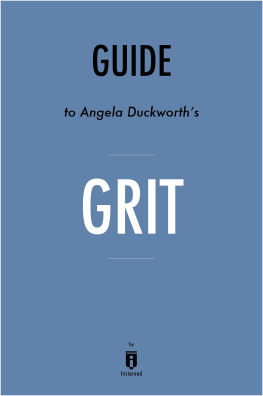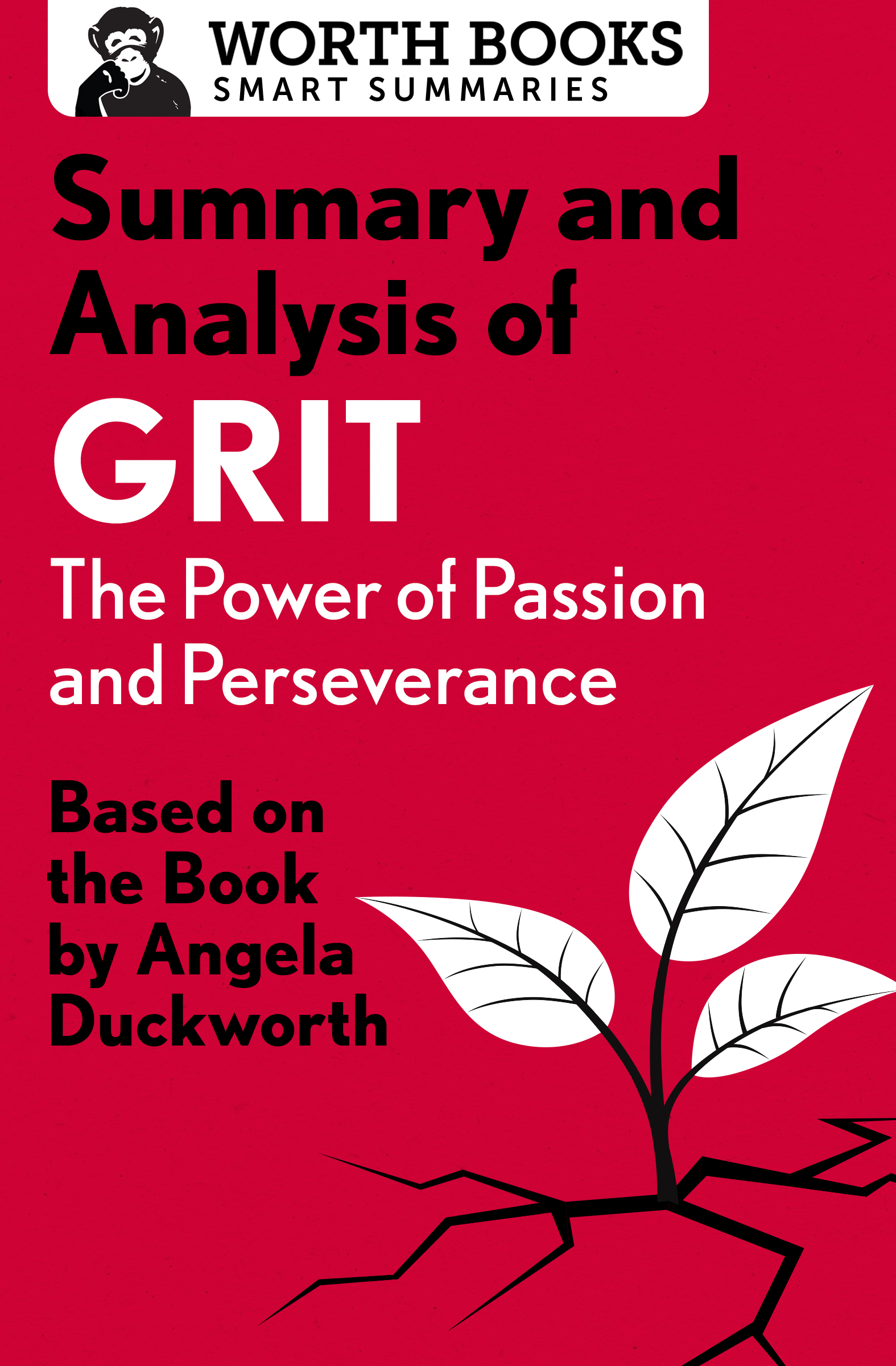Summary and Analysis of
Grit
The Power of Passion and Perseverance
Based on the Book by Angela Duckworth

Contents
Context
In our current educational and workplace cultures, where people are judged by the narrow standards of IQ and family income, respectively, psychologist and MacArthur Fellow Angela Duckworth introduces two brand-new predictors of success: passion and perseverance. Duckworth contends that these two qualities, as opposed to innate talent, are the real foundation of accomplishment, opening the door and giving hope to individuals of diverse socioeconomic backgrounds and abilities. Together, she defines these qualities as grit.
Building on the work of many other noted psychologists and researchers, Duckworth details what grit is and how one can get it, grow it, and encourage it in others.
Duckworths TED Talk on grit has been viewed more than 8 million times, and her book was an immediate bestseller, spawning articles and think pieces in outlets as varied as Slate and Scientific American .
Overview
Angela Duckworth, who holds degrees in neuroscience and psychology, offers evidence-based research to argue that the qualities she deems to be part of gritdetermination, resilience, passion, and perseverancemay matter more in shaping career and academic success than intellect or innate ability. Luck, opportunity, and ability matter as well, of course, but without grit, they are not enough. What does grit entail? Committing to something as if it is a life mission, with a full heart and love for the work; getting back up when you are knocked down; and sticking to a goal like glue. These traits are far more likely to help you get ahead than being the smartest person in the room. Those with grit strive to complete whatever they set out to do despite any pain or disappointment that may occur along the way.
The two key elements of grit are passion and perseverance. The main components of passion are interest and purpose, while perseverance is made up of practice and hope. Often passion gets lost in the equation, but Duckworth makes the distinction between sticking to something out of fear of failure and getting up day after day because of an innate interest in the endeavor and a general optimism that it can be achieved.
Duckworth goes beyond a definition of this theory to discuss how to cultivate the qualities of grit, providing concrete steps that can help readers become gritty. She shows grit at work in the examples of West Point cadets, dedicated athletes, and Scripps National Spelling Bee winners. Everyone has the ability to grow and leverage grit on his chosen path to success, she helps readers find and develop it within themselves.
Summary
Preface
The author shares the fact that she grew up in a Chinese immigrant household with a father who prized intellect and talent above anything else. There was very little that Duckworth felt she could do to impress him. Her father frequently told her, You know, youre no genius, and she internalized these put-downs. In school, she didnt test highly enough for the gifted and talented program. Never feeling like she was particularly brilliant or skilled, she got by with hard work, dedication, and a commitment to everything she took on, eventually graduating from excellent universities. But it was only when she won a MacArthur Fellowshipoften called a genius grantthat she had her light-bulb moment. She looked back on what had gotten her to where she wasa distinguished professor of psychology and a scholar who had attended some of the top schools in the worldand realized that so-called genius had little to do with it. It was about character. She knew she had a calling and she challenged herself every day. I may not be the smartest person in the room, but I strive to be the grittiest, she says.
Part I: What Grit Is and Why It Matters
Chapter 1: Showing Up
One of the most important characteristics of grit is refusing to quit. A gritty person shows up and sticks to the task at hand, no matter how hard it gets. Its that never give up attitude that determines who stays in the race. This chapter starts with a description of what West Point cadets go through in their first months at the military academy. Theyve already reached high levels of academic achievement, with top scores on their SATs and ACTs. Theyve trained hard and passed the required physicals. Theyve gotten the glowing recommendations of congressmen and senators and beaten out more than 14,000 applicants in the admissions process. Only 1,200 are admitted and enrolled, and yet one in five of these high achievers drops out before graduation. In fact, most of those who quit do so during their first summer, when they must go through a rigorous seven-week training program known as Beast Barracksor just Beastwith days of drills, marching, and calisthenics that begin at 5 a.m. and end at 10 p.m.
For generations, psychologists and West Point leaders had struggled to figure out why some of these impressive people got through that period and others quit. Examining what it takes to make it through Beast, and many other career challenges, Duckworth develops the Grit Scale, a test designed to rate the level of perseverance and passion of an individual. In 2004, West Point cadets were given the test, asked to agree or disagree with statements such as I finish whatever I begin, and [My] interests change from year to year. By the end of the Beast training, a pattern emerged: Those with the grittiest answers made it through.
Need to Know: The Grit Scale became an accurate predictor of success when applied to employees in sales, a profession where rejection is a daily, if not hourly, experience. It also worked for juniors in a Chicago public high school, Green Berets, and Scripps National Spelling Bee contestants. The conclusion? Our potential is one thing. What we do with it is quite another.
Chapter 2: Distracted by Talent
Examining some of the earliest treatises on what makes some people successful and others not, Duckworth cites a discussion between the founder of evolutionary theory, Charles Darwin, and his half cousin, Francis Galton. In 1869, Galton wrote a paper concluding that high achievers were remarkable for their combination of ability, zeal, and capacity for hard labor. Darwin agreed (although he actually considered natural talent to be the least important aspect of success). In 1907, psychologist William James furthered this hypothesis, making the observation that there is a gap between our potential and our achievementswe have the inner resources and intellect but we dont work at the optimum level. Those few who do put in the effort to push their innate powers to the outer extremes, however, are very successful.
Duckworths point is that this notion is nothing new, and yet weve allowed ourselves to become sidetracked by talent, favoring the gifted over the strivers. She first noticed the importance of striving after she quit her job at McKinsey, a global management consulting firm, to teach middle school math to inner-city students. She noticed that the kids who didnt grasp the mathematical formulas right away ultimately fared better in terms of grades than many of the more naturally gifted students. This surprised her, leading her to examine why those with less natural aptitude would excel. The pattern she noticed was that the high achievers showed up every day, focused and prepared. They were less distracted by their classmates or by what was going on outside the window. When they didnt understand something the first time around, they tried again and again, coming for extra help at lunchtime.










